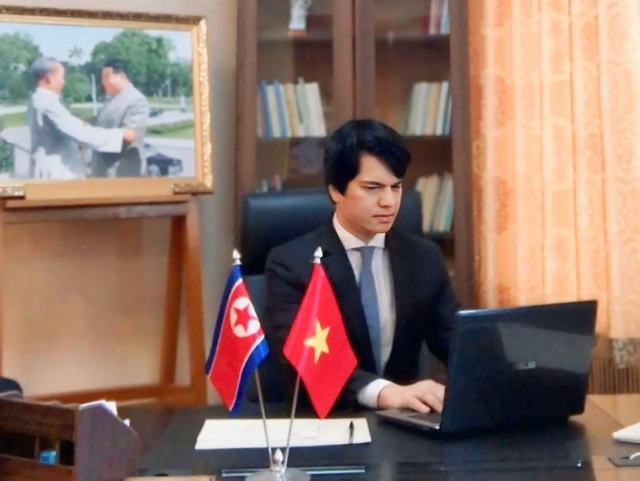General Secretary To Lam's DPRK visit marks important milestone in Viet Nam-DPRK relations
VGP – General Secretary To Lam's upcoming State visit to the Democratic People's Republic of Korea (DPRK) will mark an important milestone in the history of the traditional friendly relations between Viet Nam and the DPRK.

Vietnamese Ambassador to the DPRK Le Ba Vinh
Vietnamese Ambassador to the DPRK Le Ba Vinh made the above remarks during his interview ahead of the landmark visit.
Viet Nam and the DPRK established diplomatic relations on January 31, 1950 and the bilateral ties have always been treasured, consolidated and enhanced by the two Parties, the two States and their people. Both sides maintained mutual support and assistance throughout their national liberation and development causes.
Building on such solid ground, the two countries have maintained regular exhanges and visits at all levels. Notably, President Ho Chi Minh visited the DPRK in 1957 and President Kim Il Sung visited Viet Nam in 1958, followed high-ranking Vietnamese leaders' visits to DPRK by Prime Minister Pham Van Dong in 1961, Chairman of the State Council Vo Chi Cong in 1988, State President Tran Duc Luong in 2002, and General Secretary Nong Duc Manh in 2007.
Following the visit to Viet Nam in 2019 by Kim Jong Un, General Secretary of the Workers' Party of Korea and Chairman of the State Affairs Commission, To's upcoming visit is a vivid example for the unwavering and enduring friendship between the two Parties, the two States and the two people.
To's visit also reflects Viet Nam's consistent pursuance of its foreign policy of independence, self-reliance, diversification and multilateralization of external relations, being a friend and a trusted and responsible member of the international community.
The visit is of important significance as it takes place at a critically important time for both Viet Nam and the DPRK. Viet Nam has successfully organized major events in 2025, including the 95th founding anniversary of the Communist Party of Viet Nam, the 50th anniversary of the liberation of the South and national reunification, the 80th anniversary of the August Revolution and the National Day.
Viet Nam is doubling efforts to realize its goals enshrined in the Resolution adopted at the 13th National Party Congress in 2021, reviewing the 40-year implementation of its renewal policy initiated in 1986, and ramping up preparations for the 14th National Party Congress scheduled to take place in January next year.
Meanwhile, the DPRK is preparing to celebrate the 80th founding anniversary of the Workers' Party of Korea (October 10, 1945-October 10, 2025, accelerating the realization of the goals adopted at the 8th Congress of the Workers' Party, and ramping up preparations for the 9th Congress.
During the visit, the two top Party leaders are set to deliberate on major orientations and measures to advance the bilateral ties in an effective and substantive manner, thus contributing to peace, stability, cooperation and development in the region and the world as well.
Ambassador Le said the DPRK was among the first three countries to set up diplomatic relations with Viet Nam after President Ho Chi Minh read the Declaration of Independence at the Ba Dinh Square, declaring birth to the Democratic Republic of Viet Nam, now the Socialist Republic of Viet Nam. In 1955, Viet Nam opened its embassy in Pyongyang and the DPRK also set up embassy in Ha Noi.
The DPRK was also among the first countries to recognize and establish diplomatic relations with the Provisional Revolutionary Government that led the southern people to fight for complete liberation of the South and national reunification in 1975. For its part, Viet Nam has provided tens of thousands of tons of rice in aid to the DPRK, said the diplomat.
He expressed his belief that the Viet Nam-DPRK relations will continue to be preserved, inherited and strongly promoted, thereby making practical contributions to national development in each country and to peace, stability, cooperation and development across the globe./.
